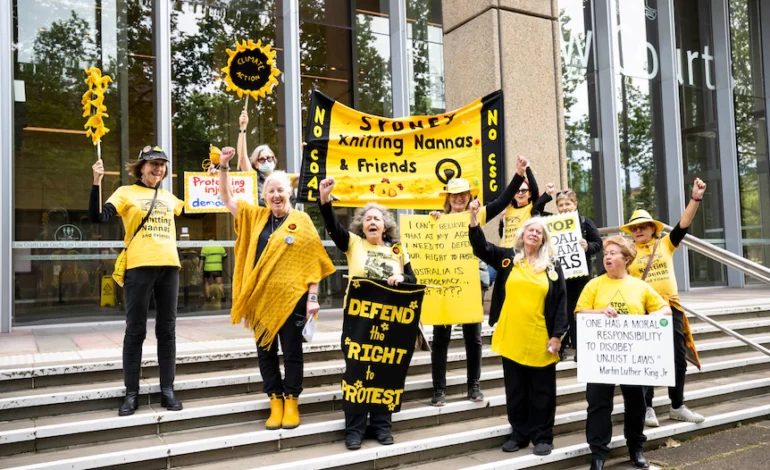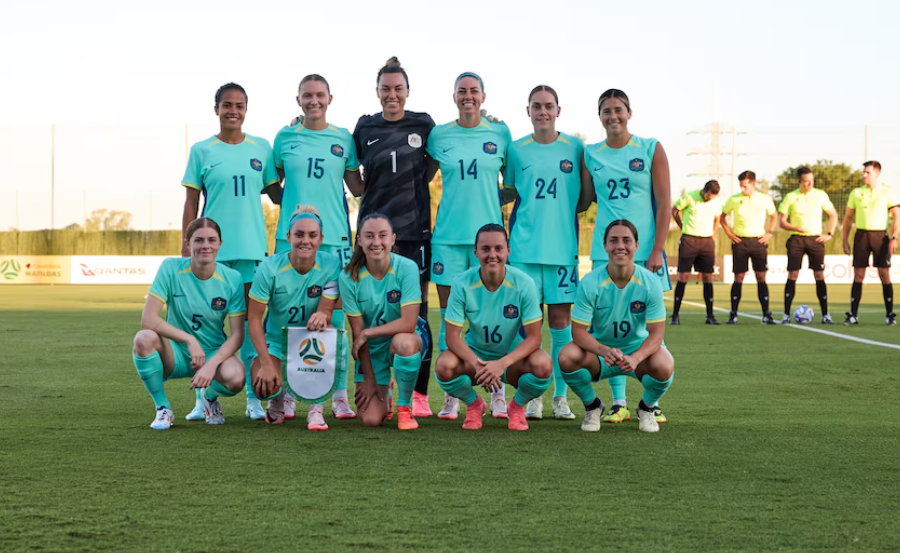Climate activists are often young radicals, so why are older, law-abiding citizens risking jail to join them?

With four decades of experience as a volunteer firefighter and law-abiding citizen, last year Alan Glover did something many would deem radical.
The 62-year-old drove a truck onto the Sydney Harbour Bridge at peak hour and blocked one lane of traffic.
Glover was demanding action on climate change and knew he was risking jail time and hefty fines under new penalties for protesters that had just been approved in NSW.
While he’s always been an activist — signing petitions, writing letters and marching — his experience fighting the Black Summer bushfires in 2019 and 2020 made him realise he needed to do more.
“I mean, nobody’s ever seen anything like that. We were just dumbstruck, the whole east coast caught fire,” Glover says. “It was a terrifying thing.”
“My background as a firefighter is important because I’m not speaking from a place of ignorance, I’m coming from a place of great knowledge and hands-on experience.
“That’s a very important thing about who I am and why I’m speaking up.”
And he’s not alone.
The Environmental Defenders Office (EDO) says the number of climate-related protests and non-violent direct actions is escalating as public frustration over the lack of government action on climate change grows.
At the same time, many states around the country are introducing harsh new penalties for protesters, in an attempt to deter actions like Glover’s.
Glover ended up walking away without a conviction, thanks to the legal team at the EDO, which has been involved in 240 legal cases relating to climate and environmental matters since 2020.
“The appropriate response from government is not to crack down on protests. Rather, it’s to deal with that very serious issue of climate change,” EDO’s director of legal strategy, Elaine Johnson, says.
“I think that demonisation of climate protesters is directing attention and criticism in the wrong place.
“As time goes on, unless we do see some serious action on climate change, we can expect more and more people to be expressing themselves in the form of peaceful protests.
“It’s not just activists anymore, scientists are taking to the streets and conducting protests and being arrested.”
Glover doesn’t see his protest on the Sydney Harbour Bridge as being all that radical.
“We were asking for some sensible, doable, immediate responses to the effects of climate change that we’re already experiencing, and part of that is fighting fires,” he says.
“I have known for decades about climate change, global warming, or whatever term you want to use.
“Now ‘the climate emergency’ is the appropriate one, because we should be on a war footing. This is not a joke.
“And I’m not sorry I did it, I’m sorry I didn’t do it 10 years ago.”
Oldies stepping up
While the stereotypical climate activist may be that of the young radical, older formerly law-abiding citizens are joining the fight, both on the ground and in the courts.
Among those are a group of older women who call themselves the Knitting Nannas.
Their mission is simple — to sit, knit, chat and plot to “save the land, air and water for the kiddies”.
That plotting has led Knitting Nanna Helen Kvelde to a diverse array of actions, from knitting outside politicians’ offices, to locking herself to a truck, and now to launching a constitutional challenge against tough new anti-protest laws in the NSW Supreme Court.
Her age forms part of her motivation for getting involved in climate activism.
“It’s heartbreaking. I think these young people are beautiful young people and why should they have to do it all,” Kvelde says.
“Us oldies should be out there supporting them and that’s probably what pushed me a bit to the point of OK, I’m prepared to be arrested, because why should these young people have to bear the burden? It’s not their fault.”
At her home in Wingham, on the NSW mid-north coast, the 72-year-old says she’s already concerned about the prospect of a dry, hot summer ahead.
The small rural town was surrounded by smoke for three months during the Black Summer bushfires.
“I’m actually feeling a little bit traumatised already because there’s smoke already around here,” Kvelde says.
“Just smelling smoke, it’s really frightening.”
Kvelde says she already feels grief about the impact climate change is having.
“I guess grief and a constant state of utter frustration and just not being able to make sense of why people would be doing this and why people are letting it happen. It just messes with my head,” she says.
“We’re fed up and worn out. Some of us are getting very old and tired and we’re not seeing any change.”
Protest crackdown
In March 2022, a month before Glover’s protest, Kvelde was arrested for taking part in a climate protest, when she blocked the entry to a major port in Sydney, alongside a fellow Knitting Nanna, Dominique Jacobs.
The pair parked two trucks across an entry to Port Botany. Kvelde attached herself to the steering wheel of one vehicle with a bike lock, while Jacobs sat on top of the other truck.
It was part of a multi-day disruption by Blockade Australia — and a turning point in the crackdown on climate protesters in the state.
On the third day of action at the port, the NSW government reacted swiftly to deter protesters from continuing and “disrupting major economic activities”.
Tough new punishments were rushed through state parliament, with fines of up to $22,000 and sentences of up to two years in jail for anyone protesting on public roads, rail lines, tunnels, bridges and industrial estates.
“They’re so unjust those laws,” Jacobs says.
“We’re the ones trying to ring the bell, the clarion call about what’s happening with the world, and then you get vilified.
“I know the other stuff doesn’t work, we’ve been doing it. We’ve signed so many petitions, so many letters, we go and stand out the front of politicians’ offices, all the ways that they deem legal and proper. They don’t have any impact.”
However, while Jacobs and Kvelde were willing to risk arrest under the old laws, they say they are deterred by the consequences of the new penalties.
And they believe that’s unconstitutional, because the penalties are so harsh they are inhibiting their right to protest freely.
Defending the defenders
The two women have launched a constitutional challenge to the anti-protest laws in the NSW Supreme Court, arguing they interfere with the implied freedom of political communication.
The case has already been heard, with the judgement deferred, meaning they’re waiting to find out what the court decides.
In her affidavit to the Supreme Court, Kvelde writes:
“I want to be tougher and braver and to participate in protest actions without fear, but instead I am not participating; I am not connecting with people; I am not exercising my right to protest; and this is all quite emotionally distressing for me as time is running out for us to work together to protect our environment.”
The Knitting Nannas are also being represented by the Environmental Defenders Office, through a program called Defending the Defenders.
When the program started 15 years ago, it was called the Citizens Representation Program. But like its name, its purpose has changed dramatically since its inception.
It was developed to fill an unmet legal need of protesters charged with relatively minor infractions, who didn’t qualify for legal aid and were representing themselves in court.
But in recent years, as states including NSW, Victoria, Tasmania and South Australia have introduced harsher penalties for protesters, the stakes in court have become much higher.
Legal landmarks
Elaine Johnson knows just how powerful the law can be in driving change, with more than a decade of experience at the EDO.
In 2019, she was instrumental in winning the landmark Rocky Hill coal mine case in NSW.
It was the first time an Australian court refused approval for a coal mine on the basis of its impacts on global climate change.
“It was a really pivotal point … in the law, in relation to the connection between fossil fuel production in Australia and global climate change,” she says.
“It was really the first point in time that a court had recognised that while Australia is not a big domestic contributor to climate change, we do have a big contribution when you look at the way in which we export fossil fuels around the world.
“Those sorts of cases are really pivotal in bringing that concept into our domestic legal system and helping to hold governments accountable and fossil fuel producers accountable.”
If successful, the Knitting Nannas case could provide a similar moment for climate protesters.
“The High Court has previously recognised on a number of occasions that the right to protest is intimately connected with democratic rights and a free and fair democratic society,” Johnson says.
“It’s about making sure that we have public spaces that are available for people to exercise their right to protest and their right to talk about issues that are important to them.
“[It’s] particularly important for those that don’t have political power, or access to power in traditional ways.”
In a statement, the NSW Attorney-General Michael Daley said the government recognised the importance of freedom of assembly and speech as rights that were integral to a democratic system of government.
“All NSW citizens enjoy a common law right to peaceful assembly, and this must be balanced with protecting people who place themselves at risk of serious harm or who cause serious disruption to the lives of citizens going about their daily lives.
“As this matter is currently before the NSW Supreme Court it would be inappropriate to comment further.”
Screaming ‘fire’
In the meantime, some activists are testing the laws on the ground, the first of them being volunteer firefighter Alan Glover.
It was just a few weeks after the tough new penalties were introduced that Glover and his fellow protester Deanna ‘Violet’ Coco drove onto the Sydney Harbour Bridge.
“I knew I was risking jail and the major fines and I didn’t care,” Glover says.
“I mean, the laws are stupid, they’re wrong and somebody’s got to challenge them.
“I’ve never been arrested in my life, I have no criminal record, obviously, and I felt I had a good chance of not going to jail, a very good chance of not going to jail.”
He was right but Coco wasn’t so lucky.
She became the first person to be jailed under the laws and was initially given a 15-month jail sentence, before it was overturned on appeal.
“Every time you get arrested, that lessens your chance of staying out of jail, as indeed happened to Violet,” Glover says.
“She was imprisoned if you can believe it, it still enrages me to think that a non-violent peaceful protester is sent to a prison for speaking up, for civil disobedience — it’s just outrageous.
“It just incenses me that, in this civilised society of ours, that they attack people who are just screaming about a terrible situation.
“If there’s a fire, you don’t quietly walk away, you scream ‘fire’.”
Just last/this week (Wed 13) 19 climate protesters had their criminal convictions overturned on appeal in the Newcastle District Court.
The protesters had each received two convictions for stopping a train on its way to the Newcastle coal terminal in April.
In handing down the first decision for 64-year-old Elisabeth Eurydice Aroney, Judge Peter McGrath said she had been motivated by “what she believed to be an existential threat to the Earth”.
Questionable tactics
Glover says that many people including his friends have questioned the effectiveness of his tactics.
“It’s a very good question because pissing people off is not the way to get them on side,” he admits.
“That said many more people have congratulated me for taking the action and speaking up and hopefully, have been empowered to do so themselves.
“But I think the smart money is going to be less disruption of private citizens and more disruption of industry particularly coal, oil and gas, the fossil fuels.”
Meanwhile he believes the tougher laws and penalties are having a detrimental impact.
“There’s still core people who will never be deterred by that, and more power to them,” Glover says.
“We have to challenge these laws because they are having the effect that the government wants, that is to shut up the messengers.”
SOURCE: ABCNEWS





